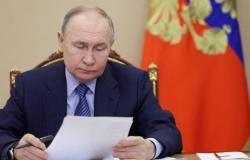Gasping for breath, MEP Marcel de Graaff (FVD) delivered a strange speech in the European Parliament on March 13. According to De Graaff, Ukraine is said to host “children’s kennels with surrogate mothers” to supply children to Western “pedo networks”. “A bit out of breath, sorry,” De Graaff panted. In Russia, on the other hand, children are said to receive “a traditional education.” From Strasbourg, the Forum parliamentarian called on the West to stop its “warmongering”. After the debate, outraged MEPs called for an investigation into the spread of Russian propaganda in the European Parliament.
Pro-Russian positions of the FVD have no longer been a surprise. Party leader Thierry Baudet called Russian President Vladimir Putin “a great hero” in the summer of 2022, who would wage a “heroic” fight against the “globalists” in Ukraine.
The statements of De Graaff and Baudet are seen in a different light now that the Czech intelligence service BIS revealed a Russian influence operation on Wednesday. Via the radical right-wing Czech website Voice of Europe, politicians from various countries are said to have been paid with Russian money to portray Ukraine in a bad light. Among them would be Dutch politicians. Both De Graaff and Baudet were extensively interviewed by Voice of Europe last year.
When asked for a response, a De Graaff employee referred to his https://twitter.com/MJRLdeGraaff/status/1773096137383182712 on X. “We want peace. We do not need any payments to convey that message!”, the FVD member writes there.
The French newspaper Le Monde wrote at the beginning of this month that the national intelligence service DGSI is monitoring an employee of De Graaff in the European Parliament. This Guillaume Pradoura would spread the “pro-Russian discourse” among his far-right contacts in France as well as in the Netherlands, Belgium, Poland and Germany.
Party leader Baudet reacted testily in the House of Representatives on Wednesday to questions from GroenLinks-PvdA MP Jesse Klaver about possible Russian payments surrounding the Ukraine referendum in 2016. Afterwards, Baudet physically threatened Klaver. The Forum leader has always denied Russian payments.
Criticism of immigration
Following the news from the Czech Republic, PVV leader Geert Wilders has requested a debate. He wants to know which Dutch politicians are involved. According to Czech media, the national intelligence service has shared this information with the services in the countries where politicians are said to have been paid.
Wilders himself was interviewed by Voice of Europe in 2017. “I look at your valuable and unique work with great admiration,” he said about the site. There was mainly criticism of immigration. For example, after an attack in Stockholm by a deported asylum seeker, Sweden was characterized as a “failed state”.
At the time, Voice of Europe was in Dutch hands. One of the initiators was Erik de Vlieger. The Amsterdam entrepreneur worked with Thierry Baudet in 2016 to bring about the Ukraine referendum. He calls it “a worrying development” via WhatsApp that Western politicians were allegedly paid with Russian money via the current Voice of Europe. “It is important that you carefully find out which politicians are joining Putin,” he adds. He does not want to answer further questions about his role at the time at Voice of Europe, or his relationship with the pro-Russian politician Baudet.
Russian trolls
Dutch businesswoman Annemiek Ploumen was the owner of Voice of Europe until at least 2020. She says she has been approached by the Czech media company that now owns the domain name to sell Voiceofeurope.com. She wouldn’t remember exactly when that was. “We already stopped doing it in 2020,” Ploumen says about her and her business partners. The reason for this would be an article in the weekly magazine The Green Amsterdammer from 2018. It stated that Russian trolls on the internet were eagerly spreading Voice of Europe’s pieces.
Ploumen says he has been “haunted for years” by the article and has experienced “a lot of misery” as a result. She was said to have been threatened, among other things. “The suspicion that I have something to do with the Russian government is something that has haunted me for years,” says Ploumen. According to her, the sale did not involve “shocking amounts”. Ploumen: “I was happy to get rid of it.”
Polish authorities announced on Thursday afternoon that security forces had raided Warsaw and the city of Tychy in the south of the country. Searches were allegedly carried out on persons who wanted to set up pro-Russian media campaigns in the European Union. The Polish authorities are said to rely on information from their Czech colleagues.
Tips? [email protected]
To share
Email the editor
Tags: Controversial proRussian website Voice Europe stage FVD prominent figures
-





